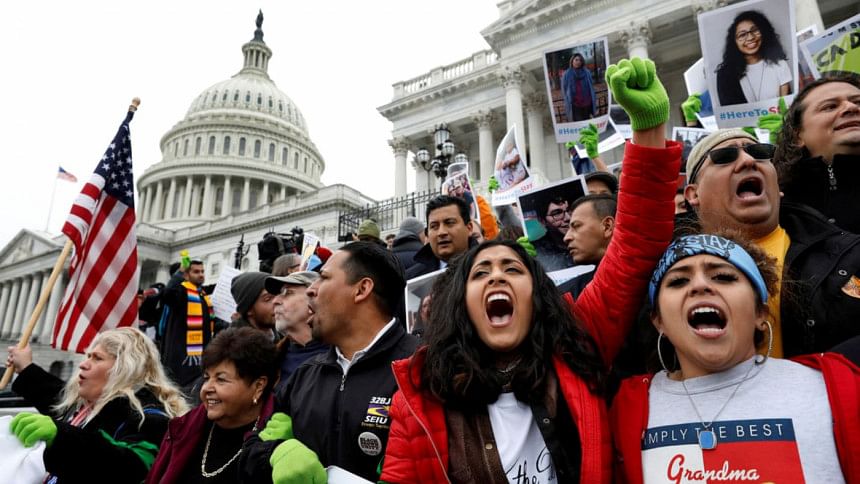Of huddled masses and government shutdowns

Asignboard in front of the Statue of Liberty read: "Government Shutdown." This was almost poetic, because the bold idea of openness that the lady upholds is at the centre of the whole US federal government shutdown shenanigan.
This has happened because the Senate Democrats and Republicans failed to pass a spending bill even on the last day of the deadline to fund federal agencies because they could not reach a compromise on the Deferred Action on Childhood Arrivals (DACA) debate. In early September, the Trump administration officially announced its plan to phase out DACA, an Obama-era programme that provides a level of amnesty to certain undocumented immigrants who came to the US as children.
The Senate Democrats had since been determined to not let the Trump administration pull the rug under the feet of 70,000 undocumented immigrant children. These individuals were encouraged to come out of hiding by the Obama administration. But now, they face the risk of deportation by the Trump administration simply because they trusted in the promise that the US government had made to them. This is as treacherous as it sounds. Many in the Republican Party were also opposed to this proposal and were willing to negotiate on it before its term expired in March. But the Democrats insisted on immediate action and voted against the spending bill to force the Republicans into negotiation.
However, DACA is not the only stubbornness of the Republicans. They also want funds for Trump's border wall and to end chain migration (the process under which immigrants can bring their family members into the US). They are doing so to tap into the anger of many Americans who see undocumented immigrants and chain migrants as threats to the republic because they get access to the welfare system without having to pay taxes for it beforehand. They also think that these immigrants steal their jobs and get involved in criminal or terrorist activities. As Republicans take advantage of these misdirected feelings and speak at length about closing down the borders and cracking down on illegal immigration, the immigrants and their children often support Democrats instead. The Democrats take advantage of this situation and speak of giving citizenship and welfare benefits to the undocumented individuals, causing further polarisation in the civil society.
But the Democrats are as much against openness as the Republicans. President Barack Obama deported more individuals in presidential history and Bill Clinton before him deported more individuals than both Bush presidents. Securing legal entry and work permit in the US has become increasingly complex under both Democratic and Republican administrations over the past decade.
I, an international student holding a F-1 visa, had to wait for a whole year before I could even do an internship related to my field of education. I am now only limited to work jobs that the college approves of up to 20 hours during the semester. But if I had entered the US by nontraditional means, especially with my parents at a young age, I would now be protected under DACA, and be able to pay in-state tuition in Virginia. If my undocumented parents were to give birth to me on American soil, I would be a US citizen already. This creates an incentive for prospective immigrants to follow extra-legal channels rather than figuring out the overly complex legal means.
So what is the solution? "Build a wall, stop the bad hombres from coming in and taking our jobs and blowing up our cities," says Trump. But the data suggests that the premise of Trump's argument is false. The Cato Institute finds that immigrants are less crime-prone than native-born Americans and they work in jobs that Americans don't typically want to work in. America needs immigrants (documented or not) as much as immigrants need America.
Pew Research Center finds that undocumented immigrants are so integral to the American economy that many sectors (e.g. agriculture) would collapse if they were deported. That is why many think tanks and research institutes have been arguing for a simpler legal immigration policy that allows free entry and exit. That way, high-skilled people could come to the US more easily and the working people could seasonally travel from their home beyond the southern border (without laying claim on the American welfare net). This used to be the norm before the Republicans and Democrats began their protectionist mania. That is when America was the greatest. But since promises to make America great again surfaced on the horizon, Donald Trump decided to amplify the mania. Instead of opening the doors to Mexico, he said that he would build a wall. The gaping hole of debt in the American budget would only get bigger if this plan was to get through and that is why some Republicans (like Sen. Rand Paul) voted against the spending bill along with the Democrats.
The Statue of Liberty opened on Monday under the New York State's sponsorship. The state governments are keeping the police, the fire service and other emergency services open. The FBI, the TSA and the Coast Guard are still operational. But the Children's Health Insurance Program, military death benefits and the Republican Party are under threat because of the federal government shutdown. Even though the Democrats share much of the blame, the people will only remember that the Republicans failed to keep the government open even when it controlled the House, the Senate and the White House. Therefore, if the Republicans do not get out of their protectionist mania right now, they may be the ones to take the heat in the upcoming midterms.
For their party's sake and for their country's sake, the Republicans must embrace the bold idea of openness.
Anupam Debashis Roy is a student of international affairs and economics at Howard University.

 For all latest news, follow The Daily Star's Google News channel.
For all latest news, follow The Daily Star's Google News channel. 



Comments